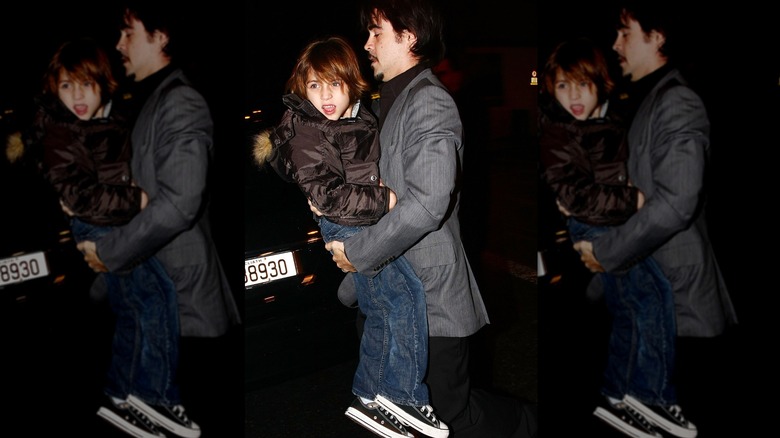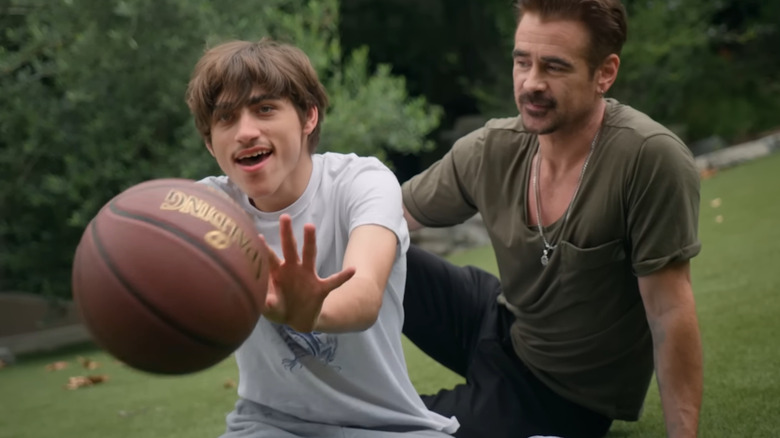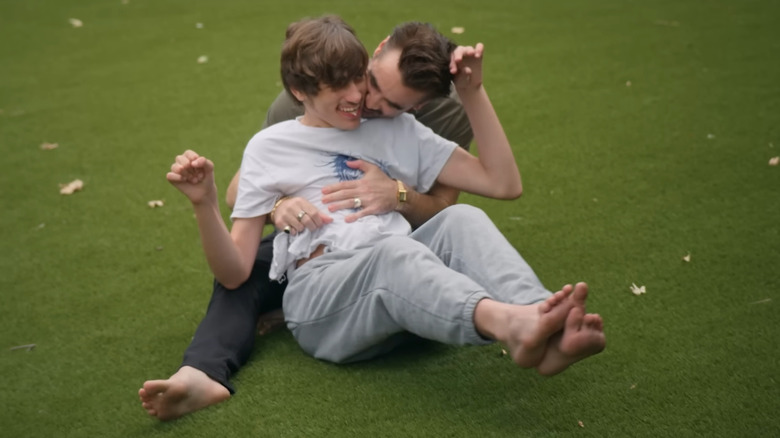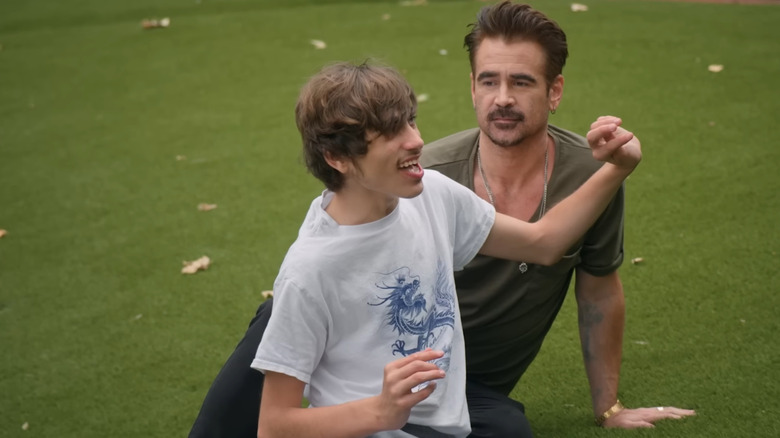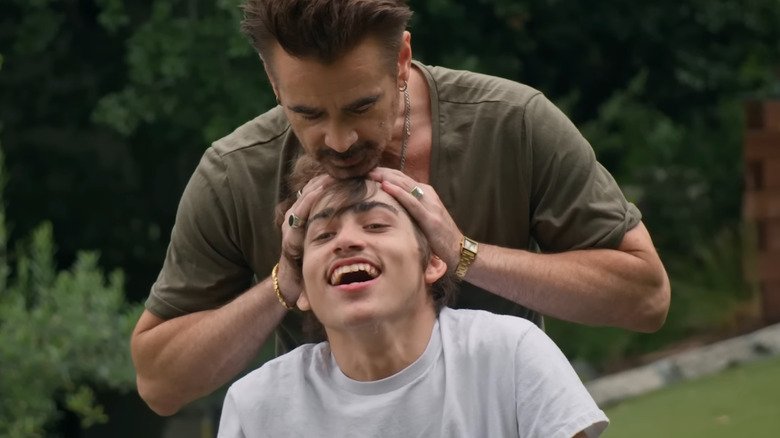Who Is Colin Farrell's Son James And What Do We Know About His Battle With Angelman Syndrome?
When you mention Irish actor Colin Farrell's name in conversation, most people know who he is (even Colin Farrell's eyebrows once had the internet talking), but his son, James Farrell, is less known. That's because Colin was a celeb that had kids the public knew nothing about. While few knew what Colin's oldest son looked like, the actor has spoken candidly about him in past interviews, and during a chat on "Saturday Night With Miriam" in 2012, he touched on James' battle with Angelman syndrome, a neurodevelopmental condition that affects a person's nervous system, causing seizures, developmental delays during formative years, an inability to speak, movement and balance challenges, and intellectual disabilities.
The condition is rare, only affecting around 1 in 12,000 to 20,000 people worldwide, according to Cleveland Clinic. Symptoms of Angelman syndrome start to present during childhood, with children often displaying traits like constant laughing, smiling, excitement, and mannerisms like hand flapping. "He has Angelman syndrome so his journey is a little bit more unique," Colin explained on "Saturday Night with Miriam" (via Her). "He's happy and healthy and hasn't had a seizure in over two years."
Naturally, James' childhood has been vastly different from his half-brother, Henry Farrell's. Colin first told the world about his son's diagnosis in 2007. Speaking to People at the time, he said he didn't think of James as disabled, but rather a child with special needs. "[James shows] amazing courage," Colin said. He was pretty open about how much of James' childhood had been an uphill battle, due to developmental delays, but there were breakthroughs that made the struggles worth it.
James Farrell has been dealing with the effects of Angelman syndrome all his life
Angelman syndrome is something one is born with, but fortunately, this condition does not affect a person's life expectancy. With sufficient care, people like James Farrell can live a long, healthy life, but may face challenges accomplishing everyday tasks most people take for granted.
James, for instance, didn't start walking at the expected age. This is because of the developmental delays caused by Angelman syndrome, which means he had to work twice as hard to stand up and take his first steps. According to Cleveland Clinic, James probably displayed numerous facial symptoms as well. These can often be easily spotted — Angelman syndrome causes some facial features to be exaggerated while others are greatly diminished. Patients often have a large tongue, a broad, short skull set in an abnormally small head with a wider-than-usual-mouth and lower jaw, as well as noticeably spaced-out teeth. James likely also had difficulty concentrating since Angelman syndrome can cause a short attention span along with hyperactivity. Sleep is also difficult for children with this disorder, but this improves as they get older.
Speaking to People in 2007, Colin Farrell said that, despite James' differences, he only ever really noticed them when the boy was among other kids his age. "From day one I felt that he's the way he's meant to be," Colin said. He also shared a big milestone James managed to reach that year. "He took his first steps about six weeks ago, and it was four years in the making. It was incredibly emotional. There wasn't a dry eye in the house," Colin said.
Angelman syndrome is often caused by a genetic mutation
As with all rare disorders, doctors still have much to learn about Angelman syndrome, and the exact cause of the disorder is still largely a mystery. Around 10% to 15% of Angelman syndrome patients never get an answer as to why they developed the condition, according to Cleveland Clinic, and in these cases, doctors can only guess at what might have triggered it. Often, these unexplained cases present in children who already have conditions related to genetics and chromosomes.
Most commonly, however, Angelman Syndrome is caused by an inactive UBE3A gene. The NHS explains that this piece of DNA is given to the baby by their mother and father, but only the mother's UBE3A gene becomes active in the fetus. Sometimes, however, this gene is absent, malfunctioning, or not working at all, which has an adverse impact on the baby's development and therefore later leads to what we call Angelman syndrome. In rarer cases, Angelman syndrome develops because the baby doesn't get a UBE3A gene from their mother at all and instead gets two from their father, which both remain inactive as the baby develops, leading to the same condition.
It's not clear what caused James Farrell's Angelman syndrome. While his father, Colin Farrell has been pretty open about his son's diagnosis, he's never gone into the finer details.
Angelman syndrome can be hard to diagnose
What often makes life harder for people with Angelman syndrome is the challenges doctors face when it comes to diagnosing correctly. Angelman syndrome can be very difficult to diagnose, especially because it's so rare and shares various symptoms with other, similar conditions, according to Mayo Clinic. James Farrell's diagnosis also took some time because doctors first misdiagnosed him with cerebral palsy when he was 1 year old. A year later, a pediatric neurologist reassessed James' diagnosis and found that he actually had Angelman syndrome. Colin Farrell told People that it was a relief to finally have the correct diagnosis because it meant they could start the right treatment.
When doctors know what to look for, Angelman syndrome can be easier to identify. Doctors usually start with a blood test, which is then assessed for any signs of genetic anomalies. These tests usually include a DNA methylation test and chromosomal microarray (CMA). The former is able to assess the child's genetic makeup and find irregularities indicative of Angelman syndrome, while the latter gives doctors an overview of the patient's chromosomes and whether any are absent. The DNA methylation test will usually tell doctors if the UBE3A gene is responsible for the patient's symptoms, but in rare cases, where the UBE3A gene is simply altered, this test might come back as normal. This is usually when doctors will start to investigate whether the patient has a rarer type of Angelman syndrome, which is caused by a faulty UBE3A gene.
Sometimes, Angelman syndrome can be diagnosed before a baby is born with a simple ultrasound, per Cleveland Clinic. Ultrasounds can detect any growth issues, which can alert doctors to potential conditions like Angelman syndrome and lead to further testing.
Doing everyday things like feeding himself was challenging for James Farrell to master
When a person has Angelman syndrome, doing some basic, everyday tasks can be challenging. James Farrell, for instance, took a long time to learn how to do things like dressing himself and eating on his own. "[James] works harder than I've ever had to work on myself," Colin Farrell told People. "It takes James sometimes 90 seconds to take a T-shirt off, but he can take the T-shirt off ... You just sit it out with him." Colin added that even putting on socks is a challenge, but still, James does these things by himself and Colin lets him. "All these things are huge, huge achievements," the actor said. "When he started feeding himself for the first time, his face looks like a Jackson Pollock by the end of it. But he gets it in, he feeds himself beautifully," Colin told People.
Angelman syndrome affects each person differently, and Colin explained how some people with the syndrome are wheelchair-bound while others can sprint around. "James is somewhere kind of in the middle of that field," Colin said. Still, James will never be wholly independent, and Colin shared that James has a full-time carer who lives with them. This allows his son to have a sense of independence. "[With his caretaker], he goes out and he goes to the beach and he goes to Universal Studios. He has a good life," Colin said.
The support available to James Farrell will dwindle when he turns 21
Something Colin Farrell often worries about is what will happen to his son when he and his ex, Kim Bordenave, are no longer around to take care of him. This is probably one of the reasons why Colin Farrell and Kim Bordenave applied for conservatorship of their son when he turned 18 — they wanted to ensure they could continue taking care of him to the best of their ability.
While speaking to People, Colin explained how, after James Farrell turns 21, much of the support available to him will start to dwindle, and he admitted that it's often been a struggle to get access to the resources James needs. "I obviously have a certain amount of means, having had a career in film for 20 plus years now, and we still struggle with finding the kind of support that James deserves and should rightfully have," he shared. He explained that many people with Angelman syndrome are left to fend for themselves when they become adults. "So you're left with a young adult who should be an integrated part of our modern society ... and more often than not is left behind," he added.
People with Angelman syndrome need ongoing care, no matter their age. The NHS notes that continued physiotherapy and sometimes anti-epileptic medication for those who continue to deal with seizures are essential for patients to continue living as normal a life as possible.
James Farrell's story has inspired many who have children with Angelman syndrome
After Colin Farrell shared James Farrell's story with People, many parents came forward to share their own experience with Angelman syndrome, thanking Colin and James for opening up and creating more awareness around the rare disorder. Many took to the comments on People's Instagram post to share their appreciation, with one person writing, "I'm a mum of disabled adult twins — thanks for bringing disabilities to the forefront." "Thanks to Colin so many of us with special angels felt just a little less lonely today," another added. "He's been a strong voice for disability and it gives me strength," someone else wrote. "Truly awesome. I have a 20 year old son with special needs and to see a famous person know and understand that we are not alone. Thank you," another commented.
Colin and James' story also inspired numerous essays, blog posts, and columns from those who know what it's like to take care of a child with Angelman syndrome. One of these parents, Christina Poletto, wrote an essay for Today, explaining how doctors told her and her husband that there was no hope for their child. "One doctor told us that our son would never walk, never talk, never love and would never know we were his parents. She was wrong," Poletto wrote. She chronicled how doctors brushed off her and her husband's concerns when they first noticed symptoms with their little boy. Eventually, their son received the same diagnosis as James, and finding a community of people who understood what they were going through helped a lot. This is exactly what Colin hopes James' story will do for others.
James' father Colin Farrell started a foundation to help support him and others with Angelman syndrome
A big worry for parents of kids with Angelman syndrome is the declining support available to them as they get older, and Colin Farrell wants to change this. It's one of the main reasons he founded the Colin Farrell Foundation. "For years [I've] wanted to do something in the realm of providing greater opportunities for families who have a child with special needs, to receive the support that they deserve, basically the assistance in all areas of life," he told People.
With the foundation, Colin hopes to provide continued support to adults with Angelman syndrome. His dream is for the foundation to provide an established, integrated community for people; a place they can go (and stay) where they are understood and among peers. Additionally, he talked about his dream of creating a camp for clients that also caters to their families and gives them opportunities to relax. "Parents of children with special needs, they find it hard to do nice things for themselves," Colin said. "Building a camp will be a part of the foundation as well; that would be a big one for me to leave behind, and it's all because of James. It's all in James' honor."
The thought of James Farrell spending the last half of his life without his parents keeps Colin up at night, and that's why he established the foundation. "The last 20, 30, 40, 10 year of James' life, he'll be somewhere where he feels like he belongs, where he feels like he's safe, and where he can garden and watch movies, and swim in the pool, and go out to the beach, and just have a full and meaningful and connected life. That'll be the dream," Colin said.
Some doctors believe a cure for Angelman syndrome is on the horizon
While no cure currently exists for Angelman syndrome, there is hope, and some doctors are optimistic about possible treatments. Dr. David Segal, PhD, who works with the Foundation for Angelman Syndrome Therapeutics (FAST), appeared in one of the foundation's YouTube videos, explaining why he's so optimistic about finding a cure. "Why I believe curing Angelman syndrome is possible, is because it seems so possible," Dr. Segal said. "In just the past few years we've seen the first gene therapies approved in the United States for any disease. ... This seems like the most hopeful time for a cure for Angelman syndrome because we know so much about the disease now."
Dr. Segal was likely referring to a gene therapy study that was published in Nature in 2020. The study, which was conducted by the UNC School of Medicine, showed promising results, with Mark Zylka, PhD, who led the study, telling Newsroom UNC Health that they've discovered a form of gene therapy that could possibly restore the function of the UBE3A gene. Tests were successful in mice when the treatment was administered in the early stages of development, and the results surprised even Zylka. The effects of the gene therapy was still prevalent 17 months after it was administered, with the study's findings indicating that repeat treatments likely wouldn't be necessary. The same results were observed when Zylka and his team tested it in culture on human neurons.
"No other treatments currently being pursued for Angelman syndrome last this long, nor do they treat as many symptoms. I am confident others will eventually recognize the advantages of detecting the mutation that causes Angelman syndrome prenatally and treating shortly thereafter," Zylka said.
Colin Farrell is positive his son would want his story told to help others
While James Farrell's story has inspired many and created some much-needed awareness of Angelman syndrome, his father had a hard time making the decision to share him with the world, afraid that he might make a big parenting mistake.
Speaking to People, Colin Farrell said that, because James can't speak, he couldn't expressly ask him whether or not he wanted to tell his story publicly, but he realized he knew his son's heart, so he went with his gut when it came to granting the interview. "I have to make a call based on knowing James' spirit and what kind of young man he is and the goodness that he has in his heart," Colin said. He admitted that he didn't exactly want to share his son with the world, but he also thought about what James would've said if he told him it would help many people like him. "He would say, 'Dad, what are you talking about? Why are you even asking me? It's a no-brainer.' So that's why we're doing it" he said.
Now that he's shared his son with the public, Colin only has one wish: that the world will not show James its harsh, ugly side, that he would not be pushed away and ridiculed by modern society, but accepted just the way he is. "I want the world to be kind to James," Colin said. "I want the world to treat him with kindness and respect."

